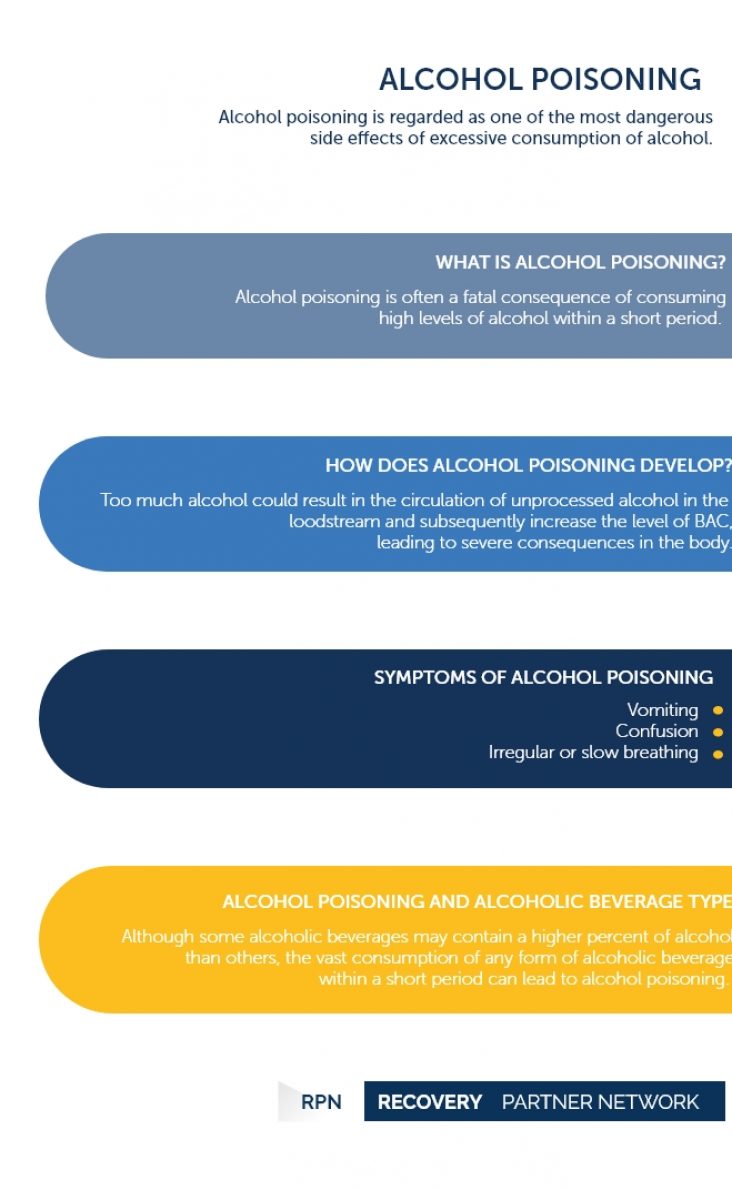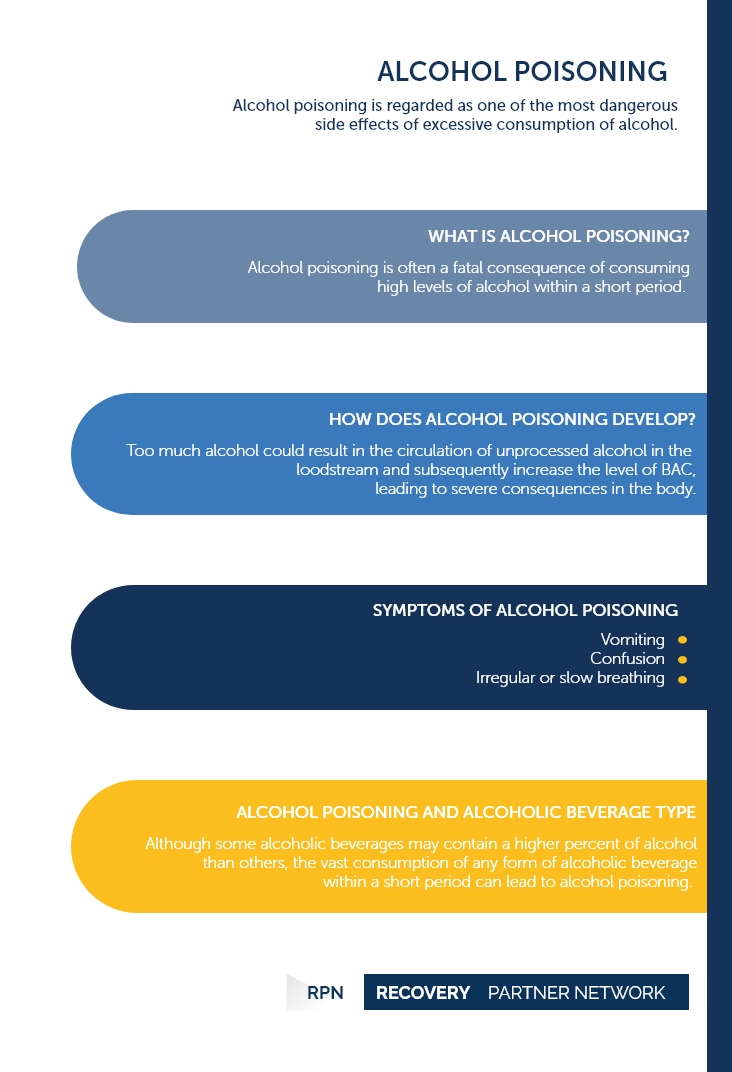Alcohol poisoning is regarded as one of the most dangerous side effects of excessive consumption of alcohol.
Alcohol poisoning
Alcohol poisoning | Table of Contents
What is Alcohol Poisoning?
Alcohol poisoning is often a fatal consequence of consuming high levels of alcohol within a short period. The harmful effects of alcohol overwhelm the body when taken in excess, resulting in severe impairment, adverse medical consequences, and possibly death. Since alcohol poisoning occurs when drinking too much, too fast, binge drinking can significantly increase your chance of experiencing this adverse effect.
The Blood Alcohol Concentration (BAC) level helps evaluate the risk of alcohol poisoning through testing blood, urine, and breath. Since factors such as age, weight, gender, alcohol tolerance, and metabolism of an individual influence how quickly the body processes alcohol, two individuals who consume the same amount of alcohol can show two different levels of BAC. This makes BAC a much better evaluation of intoxication, as it accurately demonstrates the actual level of impairment. In most states of America, a BAC level of 0.08 is regarded as legally intoxicated.
Alcohol poisoning is incredibly deadly. An individual can go from a sober state to a life-threatening situation in a matter of hours or less. Alcohol poisoning can happen to anyone, irrespective of gender, age, body weight, or alcohol tolerance. It is a major concern as over 2000 Americans die each year as a result of alcohol poisoning.
FAQ
- How does alcohol poisoning affect the body?
- What causes alcohol poisoning?
- What BAC level causes alcohol poisoning?
Alcohol poisoning can affect the body by slowing down brain activity, which negatively affects coordination and balance. Alcohol poisoning can also cause irritation in the stomach and hinder muscle and gag reflexes.
Binge drinking is the main cause of alcohol poisoning. The rapid consumption of five or more drinks within two hours for men and rapid consumption of four drinks within two hours for women can significantly increase the chances of alcohol poisoning.
BAC level from 0.250 to 0.3999 percent causes alcohol poisoning.
How Does Alcohol Poisoning Develop?
The human body breaks down alcohol, mainly in the liver. However, as the body can only process one ounce of alcohol every hour, too much alcohol could result in the circulation of unprocessed alcohol in the bloodstream and subsequently increase the level of BAC. The more alcohol consumed, the higher the BAC rises. This is particularly true during binge drinking. The high levels of unprocessed alcohol in the bloodstream can cause severe adverse consequences in the body.
The effects caused by alcohol consumption usually begins with euphoria and mild feelings of warmth. The continued consumption in higher volumes can lead to negative effects of alcohol, such as impaired co-ordination, slurred speech, and personality changes. After a certain point, the body may no longer be able to handle the excess levels of alcohol and try to purge itself of the toxic chemicals by vomiting. This is usually followed by a “blackout,” which leaves an individual with a loss of memory during that period.
However, when the body finally reaches a point where it can no longer handle the amount of alcohol in the bloodstream, the individual will lose consciousness. As the body continues to process alcohol, the individual may continue to vomit while unconscious. This can cause the vomit to fill up and obstruct the airways, which can lead to choking.
Additionally, when an individual consumes an overwhelming amount of alcohol, the body may begin to shut down, which could result in a coma. This could cause the patient to experience permanent brain damage or a number of potentially fatal health conditions, such as dehydration and cardiac arrest.
Symptoms of Alcohol Poisoning
- Confusion or stupor
- Pale or bluish skin color
- Unresponsiveness or incoherency
- Coma
- Low body temperature (hypothermia)
- Vomiting, often uncontrollably, especially while unconscious
- Seizures
- Irregular or slow breathing (fewer than eight breaths per minute or ten or more seconds in between breaths)
Alcohol Poisoning and Alcoholic Beverage Type
Certain alcoholic beverages have a higher percentage of alcohol than others. For example, hard liquor contains more alcohol content than wine. As a result, an individual who consumes four glasses of wine within a particular period is at a lower risk of developing alcohol poisoning as compared to someone who consumes four glasses of hard liquor within the same period. Consequently, the BAC of the individual who consumed hard liquor would be much higher than the individual who consumed wine. Nevertheless, it does not suggest that consuming wine and beer in vast quantities within a short period will evade its adverse consequences. Hence, it is important to note that all alcoholic beverages encompass the risk of alcohol poisoning.
How to Treat Alcohol Poisoning
Alcohol poisoning is a medical emergency. The first and the most important step you can take is to call emergency services as alcohol poisoning is often fatal if left untreated.
Although immediate medical attention is the first and vital step for alcohol poisoning, there are a few first aid measures that can be taken in the meantime.
- Ensure that the patient is lying on their side and not on their back to avoid the risk of choking.
- Continue to monitor the patient.
- Do not leave the patient unattended.
- Ask for assistance from others if necessary.
- Keep an eye on their breathing.
FAQ
- Can drinking water flush out alcohol?
- How is alcohol poisoning treated at the hospital?
- When should you take someone with alcohol poisoning to the hospital?
- What should be avoided during alcohol poisoning?
- What should you do if someone has alcohol poisoning?
Water can decrease the BAC level in an individual. However, it will still take one hour to metabolize 20 mg of alcohol.
The individual will be carefully monitored until the alcohol leaves their system. However, if the condition is severe, a tube will be inserted into their mouth and windpipe to help them breathe and remove blockages.
When their breathing slows down to eight or fewer breaths per minute, or if their breathing lapses for more than ten seconds between breaths, it is time to take them to a hospital.
Avoid giving the person in question any form of food, drink, or medication as it would only cause more harm.
The most important thing to do if you suspect someone of having alcohol poisoning is to call 911. Until the paramedics arrive, it is important to stay with the person and gently turn them to their side so that they do not choke on their vomit while also keeping them calm and comfortable.
How to Prevent Alcohol Poisoning
Alcohol poisoning is highly preventable. Following the below-mentioned steps can tremendously help in avoiding the development of such dangerous circumstances.
- Drink in moderation
- Try to have one drink per day or abstain
- Drink slowly
- Ensure to drink sufficient amounts of water
- Do not drink on an empty stomach
- Store alcohol products carefully and out of reach of children
- Educate family and friends, especially teens, on the dangers of alcohol poisoning
Recovery Partner Network
We aim to educate and empower. If you feel our library of resources does not cover your specific need, reach out to us, and we would be happy to help.
STATISTICS
© Copyright 2025


